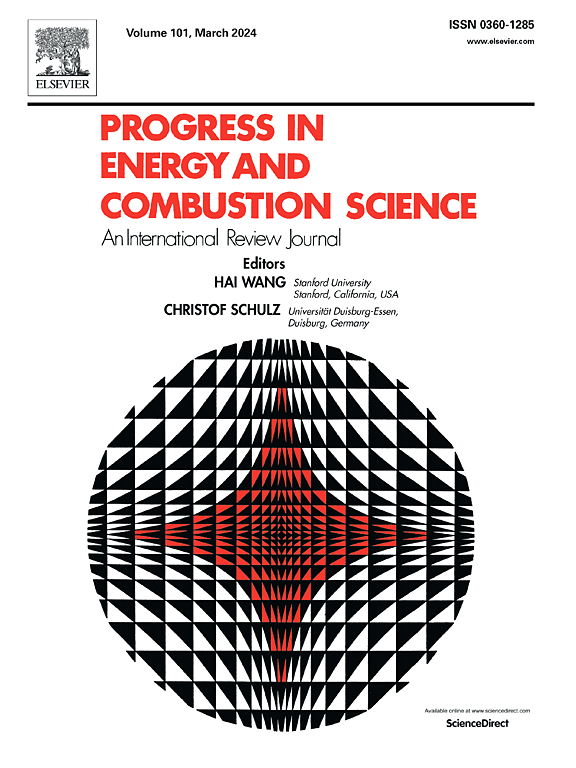A comprehensive review on flash point behavior of binary ignitable mixtures: Trends, influencing factors, safety and fuel design implications, and future directions
IF 37
1区 工程技术
Q1 ENERGY & FUELS
引用次数: 0
Abstract
The flash point (FP) behavior of binary ignitable mixtures, which are the simplest form of mixtures and fundamental building blocks, is essential for understanding multicomponent mixture behavior. This knowledge plays a vital role in process and chemical safety as well as in fuel design. In the present review, the FP of 245 independent binary ignitable mixtures, composed of 102 individual pure compounds derived from 69 published articles, was investigated. The mixtures based on their chemical class were categorized. Investigations on their ideal or extreme FP behaviors revealed that certain combinations have a higher potential for demonstrating extreme FP behaviors such as alcohol + aromatic hydrocarbon, alcohol + ester, alcohol + alkane, aromatic hydrocarbon + organic acid, alcohol + organic acid, phenol + alcohol, phenol + ketone, and phenol + pyridine. It was found that the occurrence of extreme FP behaviors is not only related to the chemical class but also to the molecular structure, the non-ideality of binary mixture, and the temperature gap between FP values of the pure constituents in each binary blend. These findings can be utilized to enhance the safety level of processes or operations involving these binary mixtures. Furthermore, this information can be valuable in fuel design for specific purposes and improve combustion, thanks to a comprehensive knowledge regarding the FP tendencies of each binary category and the potential for extreme FP behaviors.
二元可燃混合物闪点行为的综合综述:趋势、影响因素、安全性和燃料设计意义以及未来方向
二元可燃混合物是最简单的混合物形式和基本组成部分,其闪点(FP)行为对于理解多组分混合物的行为至关重要。这些知识在过程和化学安全以及燃料设计中起着至关重要的作用。本文研究了69篇文献中由102个单独的纯化合物组成的245个独立的二元可燃混合物的FP。根据混合物的化学类别进行了分类。对其理想或极端FP行为的研究表明,醇+芳香烃、醇+酯、醇+烷烃、芳香烃+有机酸、醇+有机酸、酚+醇、酚+酮、酚+吡啶等组合具有较高的FP极端行为潜力。结果表明,极端FP行为的发生不仅与二元混合物的化学类别有关,还与二元混合物的分子结构、非理想性以及各二元混合物中纯组分的FP值之间的温度差有关。这些发现可用于提高涉及这些二元混合物的过程或操作的安全水平。此外,由于对每个二元类别的FP趋势和极端FP行为的可能性有全面的了解,这些信息对于特定目的的燃料设计和改善燃烧是有价值的。
本文章由计算机程序翻译,如有差异,请以英文原文为准。
求助全文
约1分钟内获得全文
求助全文
来源期刊

Progress in Energy and Combustion Science
工程技术-工程:化工
CiteScore
59.30
自引率
0.70%
发文量
44
审稿时长
3 months
期刊介绍:
Progress in Energy and Combustion Science (PECS) publishes review articles covering all aspects of energy and combustion science. These articles offer a comprehensive, in-depth overview, evaluation, and discussion of specific topics. Given the importance of climate change and energy conservation, efficient combustion of fossil fuels and the development of sustainable energy systems are emphasized. Environmental protection requires limiting pollutants, including greenhouse gases, emitted from combustion and other energy-intensive systems. Additionally, combustion plays a vital role in process technology and materials science.
PECS features articles authored by internationally recognized experts in combustion, flames, fuel science and technology, and sustainable energy solutions. Each volume includes specially commissioned review articles providing orderly and concise surveys and scientific discussions on various aspects of combustion and energy. While not overly lengthy, these articles allow authors to thoroughly and comprehensively explore their subjects. They serve as valuable resources for researchers seeking knowledge beyond their own fields and for students and engineers in government and industrial research seeking comprehensive reviews and practical solutions.
 求助内容:
求助内容: 应助结果提醒方式:
应助结果提醒方式:


